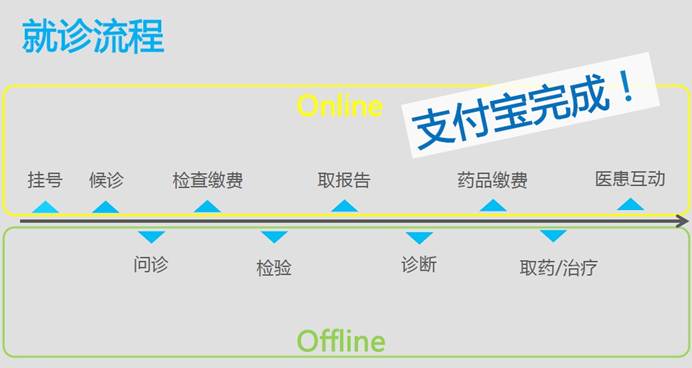Alipay announced a Future Hospital plan, which aims to facilitate the workflow efficiency in the current healthcare system in China. Through such a program, Alipay plans to utilize its own platform to enable users to register for consultations, monitor queues, conduct payments, review results as well as report on user experience.
Additionally, the plan also aims to take advantage of Alipay’s mobile payments, cloud computing and database to remold a more efficient healthcare system in China.
According to the product manager of Alipay Healthcare, Zhao Liansheng, the plan will launch a so called “service window” on Alipay wallet, the mobile app by Alipay, through which the users will be able to complete the entire process of hospital visit from registration to retrieve medical check report. This helps to eliminate the issues like multiple queuing. It is also believed that such improvement will free up medical resources by identifying and limiting the repeated registration accounts, often times known as scalper tickets.
Similar to the review function available in Taobao, Alipay hopes to also add a reviewing function to the service window, through which doctors and patients will be able to comment on each other upon the completion of medical checkup process.
Alipay will also provide technical support like free Wi-Fi and indoor navigation to guide users through different hospital departments for registration, checkup, payment and medicine pickup.
Currently, phase one of the Future Hospital only supports self funded clients, Alipay claims they’re working actively to incorporate the medical care insurance system into the plan, thus to support both self funded and medical care insurance accounts.
Alipay claims that so far they have reached corporation agreements with over 10 triple-A grade hospitals in first tier cities including Beijing, Shanghai and Guangzhou, two of which have now entered the testing phase of the proposed Future Hospital plan.
After phase one, there is an even bigger plan that allows Alipay to take its presence in the whole healthcare system to a different level. Zhang Jiangang, an exec at Alifinance, mentioned that in the next 5-10 years, in order to implement phase two of the said plan, Alipay will establish a comprehensive online platform to allow virtually mobile prescription, medicine delivery, hospital transfer, medical care insurance reimbursement, commercial insurance as well as damage claims, as part of the improvement of healthcare reform in China.
In phase three, Alipay will further utilize its database and cloud computing capability to work with wearable technology manufacturers, medical care institutions and even government agencies to construct a resource backed healthcare management platform. “This is a long term plan to realize the shift from cure to prevention.” Zhang Jiangang said.
This is not the first time that Alibaba Group, the owner of Alipay, gestured that it will move into the medical care and pharmaceutical industry. Back in June 2011, Alibaba launched Tmall Medicine (Tmall Yao), which was later questioned for its qualification and policies. Early this year, Yunfeng Capital, a private equity firm co-founded by Alibaba Chairman Jack Ma, and Alibaba Group together acquired a 54.3% stake in pharmaceutical data provider CITIC 21CN, a Hong Kong-listed subsidiary of Chinese conglomerate CITIC Group, for HK$1.33 billion ($171 million). Interestingly enough, CITIC 21CN owns the very first license that allows third party online drug distribution through 95095, a drug distribution platform.
Scully Wan : Beijing based tech contributor. wan@gmail.com
Source : Alibaba’s Ambitious Future Hospital Plan: Facilitating the Current Healthcare Service in China





![[스타트업 탐방] 오후 5시, 자리는 비었지만 일은 계속되는 회사… 하이퍼커넥트 DSCF6818](https://platum.kr/wp-content/uploads/2025/11/DSCF6818-150x150.jpg)
![[BLT칼럼] 엔젤투자의 3가지 즐거움 1114b3aee2b12](https://platum.kr/wp-content/uploads/2025/11/1114b3aee2b12-150x150.png)

댓글 남기기